Adult Cancer vs. Pediatric Cancer: The Difference Starts on Day One
Did you know that pediatric cancers are different than adult cancers? The St. Baldrick’s Foundation does one thing: fund pediatric cancer research. You can, too.
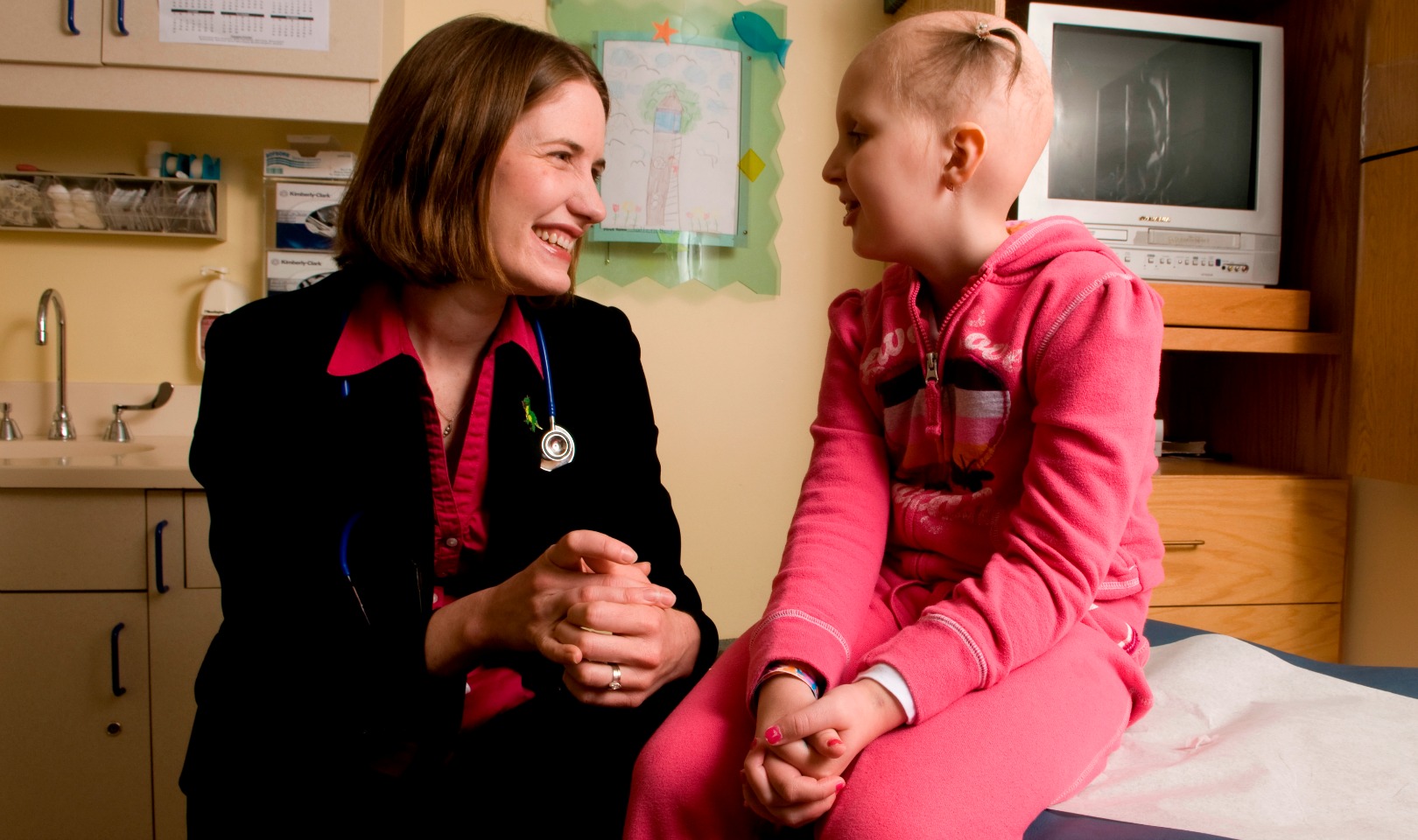
St. Baldrick’s Scholar, Dr. Kris Ann Schultz, talking with a childhood cancer patient.
St. Baldrick’s Scholar, Kris Ann Schultz, M.D., M.S., has given the Day One talk. She studies rare childhood tumors at the Children’s Hospitals and Clinics of Minnesota.
“Whether a child has been sick for a day, a week, or a year, it’s a talk no parent is really prepared to have,” said Dr. Schultz.
But as difficult as that first conversation can be, Dr. Schultz is inspired by the way many parents are able to step forward and ask important questions.
Funding First-Rate Children’s Cancer Research With St. Baldrick’s Summer Grants

There is something more exciting than barbecues, beach balls, and sprinklers in the summertime at the St. Baldrick’s Foundation. Every summer, childhood cancer research grants are awarded to the best and most-promising researchers and institutions in the world — bringing us one step closer to a cure for childhood cancers.
Here’s how our grant funding cycles work:
Rainbow Hospital Staff Shave Their Heads for Kids With Cancer
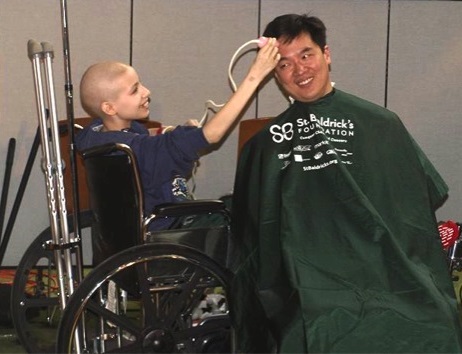
St. Baldrick’s Honored Kid Kelly shaves Dr. Huang’s head at the Rainbow Babies and Children’s Hospital head-shaving event.
“To me, it was a no-brainer,” he said.
Like any pediatric cancer researcher, Dr. Huang, a St. Baldrick’s Scholar, knows that funding for kids’ cancer research is hard to come by. And as a physician at UH Rainbow Babies and Children’s Hospital in Cleveland, he sees firsthand the effect that childhood cancer has on kids and their families.
Despite having devoted his career to helping kids with cancer, he wanted to do something more.
So he became a shavee℠.
Three Weeks Till Bald: Superman Sam’s Mom Speaks Out on the 36 Rabbis’ Shave
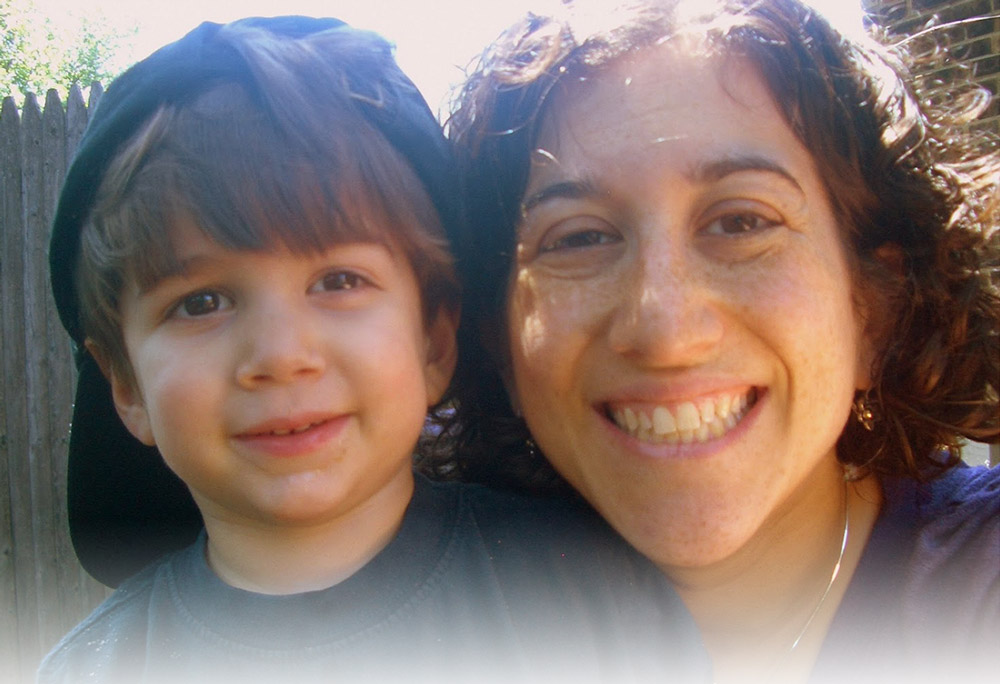
For Sam, losing his hair was a big deal at first. I think it was more the idea of the change rather than the actual hair loss. It changed how he looked, and it changed how people looked at him. Throughout his treatment, he was mostly bald, and then as it grew back after treatment, we noticed and celebrated.
St. Baldrick’s Researcher Blocks Pathway in Low-Grade Gliomas to Reduce Cancer Cell Growth
Scientists might have found a way to starve off cancer cells in some pediatric brain tumors. Help support childhood cancer research like this by donating today.

So we can’t stop the pathway from being turned on — at least not at this point. But we might be able to stop it from working, as Dr. Raabe and his team have shown in a study published in the December issue of the journal Neuro-Oncology.
St. Baldrick’s Researcher Uses Novel Drug Screening Method for Potential New ALL Treatments
Your donation to St. Baldrick’s funds pediatric cancer research. Donate now.

Now, thanks to advances in modern chemistry, scientists are able to synthesize hundreds of thousands of known drug compounds and store them in vast chemical libraries. With the aid of highly technical robots and computers, researchers can test the entire library for effectiveness in treating a certain disease in a process known as high-throughput screening.
St. Baldrick’s Funds Childhood Cancer Research at St. Jude Children’s Research Hospital
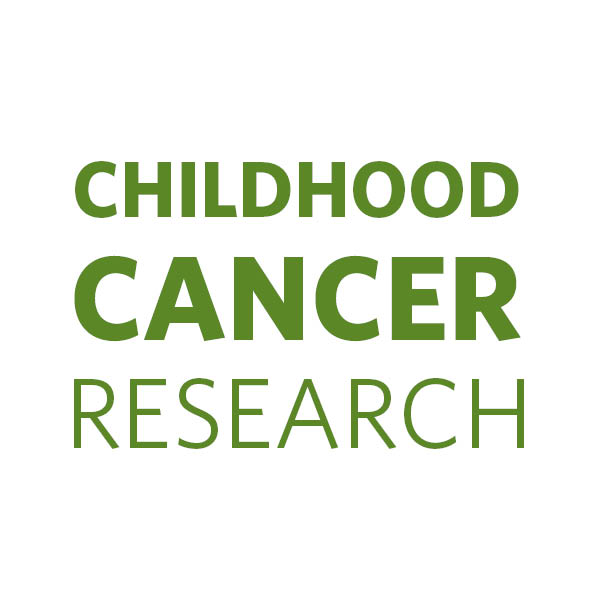
Linda Holmfeldt, Ph.D., received a $100,000 St. Baldrick’s Research Grant to support her project focused on hypodiploid acute lymphoblastic leukemia (ALL). Patients with this subtype of leukemia, in which the leukemic cells have lost multiple chromosomes, have a much lower chance of survival. Dr. Holmfeldt and her team have identified multiple gene mutations that are believed to be responsible for allowing the cancer to grow.
AML Stem Cell Research Funded by Childhood Cancer Foundation

Benjamin Mizukawa, M.D., received a three-year, $330,000 St. Baldrick’s Scholar award to support his work focused on acute myeloid leukemia (AML). Although most leukemia cells are readily killed by chemotherapy, if the leukemia stem cell is not killed in treatment, chances of survival are very low.
“We are studying how leukemia stem cells maintain self-renewal, or the ability to give rise to new leukemia cells,” Dr. Mizukawa explained. “By understanding the signals needed for self-renewal, we hope to identify new drugs to eliminate the leukemia stem cell and prevent relapsed disease.”
What Is Astrocytoma?

We asked Dr. Jean Mulcahy Levy, a St. Baldrick’s Scholar, about astrocytoma, a type of childhood cancer. Read her explanation of astrocytoma symptoms, treatment options, and research opportunities.
What is astrocytoma?
Astrocytoma is a type of tumor that can happen in the brain or spinal cord. They are one of the most common brain tumors seen in children, with approximately 700 children diagnosed with low-grade astrocytoma — a slow-growing tumor — each year.
$13 Million Raised for Childhood Cancer Research
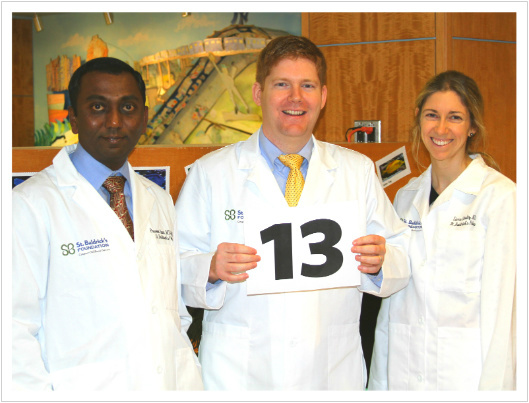
Dr. Anur Praveen, Dr. Kevin J. Curran, and Dr. Liora Schulz
Helping to announce this shearly fantastic news is (from left to right): Anur Praveen, M.D., AVM Traders St. Badrick’s Fellow; Kevin J. Curran, M.D., St. Baldrick’s Scholar; and Liora Schultz, M.D., Markit St. Baldrick’s Fellow.
« Newer PostsOlder Posts »

 SBF
Tweets »
SBF
Tweets »